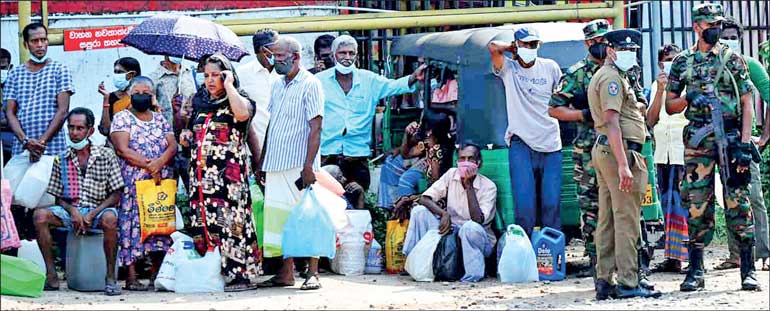Tuesday Feb 17, 2026
Tuesday Feb 17, 2026
Friday, 20 January 2023 00:00 - - {{hitsCtrl.values.hits}}

If the powerful countries extend their help, Sri Lanka will be able to solve the balance of payments crisis sooner or later. But, Sri Lanka and its people will be compelled to live for a long time in the current socio-political environment which is corrupt and unpleasant

The abuse of official power by the heads of state in Sri Lanka to amass illegal wealth or to allow their cronies to do so, and also to encourage the public representatives elected to legislative bodies such as the Parliament and Provincial Councils to transact trading business with the Government which is contrary to the law, can be considered as the prime origin of state level corruption in Sri Lanka.
So much so, a corrupt policy which allows the cronies of the head of state to earn wealth illegally and also letting the ruling party members of parliament to transact business with the Government against the law while the heads of state themselves are involved in amassing wealth using or rather abusing the enormous power they have, has become a widespread practice in Sri Lanka. The Members of Parliament of any country where a system of democratic governance prevails are not allowed to transact business with the government. It is considered as a serious offense that leads to depriving the person committing the offense of his seat in parliament.
According to the current law of Sri Lanka, transacting business with the government by a member of parliament is considered to be a punishable offense that could result in the deprivation of the seat of the culprit. It is the Soulbury Constitution and not the 2nd Republican Constitution applicable for this subject. Albert Silva, the UNP candidate elected to the Galle constituency at the 1977 general election was deprived of his parliamentary seat by the Court because he possessed a license for distribution of kerosene oil issued by the Petroleum Corporation in his name. President Jayewardene changed the good policies, practices and traditions that had been maintained by the state administration until then, and turned them upside down and maneuvered the power to rule the country into an easy way for the power group of the ruling party including the head of state to amass wealth by unlawful means.
President Jayewardene launched the parade by giving the valuable land owned by the Land Reform Commission to his MPs and his close friends and cronies at a nominal price. In order to dispel any doubt that the MPs might have had about acquiring land against the law, the President himself set a precedent by exchanging a barren coconut estate owned by him for a fertile one belonging to the Land Reform Commission. Along with that, the President also allowed the ruling party MPs to transact business with the Government contrary to the law.
Consequently, the members of the ruling party became government contractors, suppliers or buyers and also the licensed businessmen of the Government.
Although it was illegal for the members of parliament to do so, the President prevented the law from being implemented against them. Forcing the UNP member who represented the Kamburupitiya constituency to resign from the seat and appointing Albert Silva who was deprived of his parliamentary seat by the judiciary, as a chit MP to Kamburupitiya constituency is one example that can be cited to illustrate this fiasco.
Defending the corrupt system
The main opposition of the parliament and the other opposition parties that represented diverse political trends knew that the corrupt tradition introduced by President Jayewardene was contrary to the accepted democratic parliamentary traditions as well as the rule of law.
But strangely no one representing the parliament has uttered a single word in parliament against this corrupt and ugly practice.
Even after some unpleasant and horrible facts pertaining to this situation were disclosed by the recorded phone conversations between the United National Party MP Ranjan Ramanayake and some prominent figures in the country i.e. after the revelation that there are owners of distilleries, owners of taverns, contractors and licensees doing business with the Government among the Members of Parliament surprisingly, none of the political parties or party leaders or members of Parliament has submitted a proposal to investigate this situation which is illegal and has undermined the prestige and the dignity of Parliament.
Why is that? Is the “appalling silence” maintained by all of them in relation to this issue an unfortunate coincidence? Or is it something that should be treated as an inexplicable phenomenon from a political point of view? What have the political parties or the leaders of those parties got to say about it? Why did the Speakers of the Parliament fail to perceive this dreadful and illegal situation as a heinous crime?
Darkness only and no silver linings
At the outset, if at least one MP, not a large group of them had stood up against this ugly and corrupt system it would have become unsustainable. But all or most members of the opposition wanted to see it prevail until they came to power. After getting power, what they did was to add new elements to it thereby making the system stronger than it was and get the maximum advantage of it. Now, 45 years have passed since this corrupt system has been established, but during that long period, no political party, party leader or a Member of Parliament has spoken strongly against MPs doing business with the government which is illegal and contrary to the law.
Apparently there is an interconnection between the MPs doing business with the government and presidents making illegal earnings from public property in their charge. The presidents have traditionally adopted a policy of allowing the members of the ruling party to do business with the government because it has become a necessary condition for the presidents to have the support of the members of the ruling party to acquire wealth for themselves illegally as well as for allowing their cronies to do the same.
Corruption in the country has become an uncontrollable issue due to the fact that the Executive and the Legislature that steer the helm of the country have tended to act on a policy of making undue wealth. The generation of old politicians, almost all of them, in one way or the other, have been a party that has defended the prime source of this corrupt system. As such, a serious or far-reaching change in the subject of corruption cannot be envisaged even if they get the government power. It is unlikely that a completely new group will gain power in the next election. Even if such a group will secure power by something like a sleight of miracle, they do not seem to possess the wisdom and discipline necessary to bring about a tangible transformation. In that sense, Sri Lanka is not in a stage where new hopes can be kindled for a better future, quickly.
The dilemma of Sri Lanka
Sri Lanka can be considered as a country that is caught up deeply in a three-pronged crisis: social, political, economic or financial. Another negative aspect of Sri Lanka’s crisis is that many of the things that should have been reformed have now become long overdue, making reforms extremely difficult. In the balance of payments crisis, the IMF was approached only after the country fell bankrupt, not before. It made the ability to overcome the crisis enormously difficult. The need for resolving the national crisis which is primarily centred on the issues of caste, race and religion was contemplated not immediately after concluding the internal civil war, but only after 13 years. The need for restricting the number of employees in the public sector to 700,000, which is the realistic cadre required to maintain it, was seriously thought about only after the number has exceeded the limit of 1,500,000, and not at least before it reached the 1,000,000 mark.
The dire need for eliminating corruption in public service was also contemplated not when the share of income earned by corrupt public servants by corrupt means remained at a level of 10-15% of their income, but only when it has increased to 75 or 100 percent or sometimes even more of their total income. This situation can be described as the biggest dilemma that Sri Lanka has to face in the subject of reforms. Accordingly, Sri Lanka is not in an easy situation to introduce the essential reforms; it is going through a tremendously difficult situation as far as reforms are concerned.
When President Ranil Wickremesinghe invited the other political parties to join a reform program and if those parties were able to reach a common consensus for a reform program leading to a major change in the system and also if they had been successful in making it a public participatory program with an interim constitution being adopted so that no one could change it for narrow and subjective purposes, even under the present circumstances where things have gone too far from solving the problems easily, still it would have been possible to solve the crises to a large extent, though not completely.
But now Sri Lanka is in an unfortunate situation where it has lost that opportunity. The political future of the country is also in a weird situation which is vague, uncertain and chaotic. If the powerful countries extend their help, Sri Lanka will be able to solve the balance of payments crisis sooner or later. But, Sri Lanka and its people will be compelled to live for a long time in the current socio-political environment which is corrupt and unpleasant.